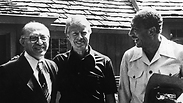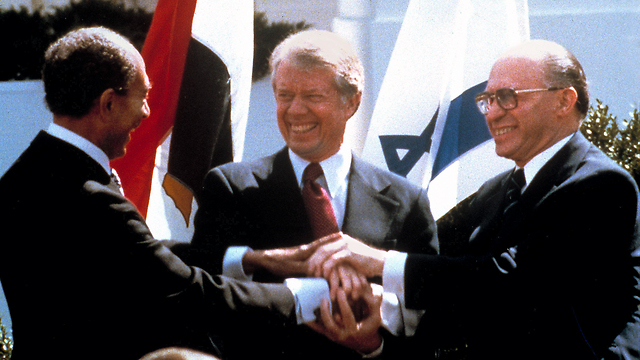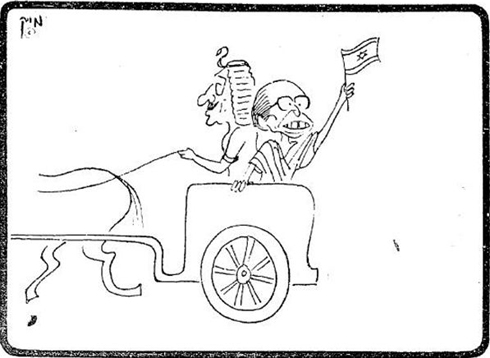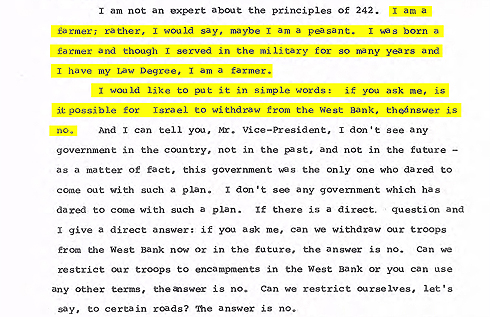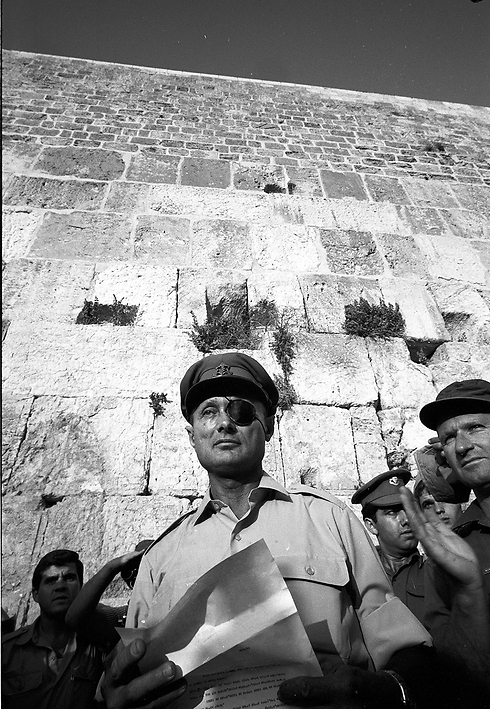Israeli security fears over Palestinian terror, a full withdrawal from the West Bank, dangerous complacency and an American administration seen as blind: The challenges facing US efforts to broker peace between Israel and a hostile neighbor are the same today as they were when Jimmy Carter brought Menachem Begin and Anwar Sadat together 35 years ago.
Newly released documents and secret memos in Israel's state archives shed new light on the 1979 peace efforts, 35 years to the day since the historic agreement was signed.
The documents offer a rare glimpse into the discreet process, and show those politicians had the same fears, made the same threats and used the same clichés as in the current round of negotiations with the Palestinians.
A major part of the documents deal with the Palestinian issue. Egyptian President Anwar Sadat, as a leader of an Arab nation, faced great pressure from other Arab countries to find a solution for the Palestinians territories. The issue led to a crisis in talks, until a formula was found allowing the parties to skip over this huge mine, leaving it for next generations to sort out.
'We need to make peace with Arabs, not US'
On July 2nd 1978 then-foreign minister Moshe Dayan was set to meet then-US vice president Walter Mondale to continue discussions over the progress of negotiations between Israel and Egypt. Relations between Israel and the US were strained at the time, as despite initial assessments, no progress had been made after Sadat made his historic visit to Israel. The US, for its part, was pressuring Israel to retreat from Sinai, while Sadat demanded a retreat from the West Bank as well.
Dayan told Mondale that the American pressure complicated negotiations. "It is not for me to criticize the president, but it doesn't mean I am not worried or insulted by what is said in the White House. We need to make peace with the Arabs, not the US".
The West Bank issue, Dayan claimed, was being used as leverage against Israel. "I feel that Sadat senses that unless he manages to bring in Jordanian King Hussein in order to achieve a treaty that will include the West Bank, he will not sign anything and will continue to extort us, taking you with him in the process, so no matter what we do we will always be on the wrong side".
Vice President Mondale replied: "The US believes that the process in the West Bank should involve Jordan."
Dayan criticized the dominating American style, which he claimed attempted to dictate to Israel how to operate. "You are formulating the answer and telling us where to sign. We are looking for a way to continue the negotiations, but the main question is whether Sadat agrees to sign the agreement regarding Gaza, Judea and Samaria as well, or wait until Jordan joins the talks."
US 'objects' to independent Palestine
Towards the end of the meeting, Mondale invited Dayan to a summit in London, where Egypt was expected to present its take on a peace deal. The discussion that took place then seems as if it was taken directly from the current US-brokered talks; same anxieties, same claims and same clichés: "I am hearing from you the same things I am hearing from the other side," said Dayan to Mondale, "'hand in Judea and Samaria and the Gaza Strip and only than we will start negotiating with you.'"
At a cabinet meeting to which Mondale was invited, Commerce and Tourism Minister Yigal Horowitz said: "I know what war is. In the last one I lost a niece and a nephew, and both my sons took part in the fighting. So I must tell you Mr. Mondale, that even though we may disappoint the US and the rest of the world, we must never return to '67 borders and risk having the enemy 20 to 30 km from Tel Aviv. The Yom Kippur War would look like child's play compared to what we could expect if we did that."
"Our stance is that peace is an Israeli interest," replied Mondale. "It was your leader who said that battlefield victories are transient. We have never demanded a full retreat to the '67 borders, obviously we need to negotiate and reach a compromise that Israel would accept. Also, we have never negotiated with the PLO and will not do so until they acknowledge Israel's right to exist and accept (UN resolution) 242. Frankly, we rather object to the idea of an independent Palestinian state."
'Don't push us into a corner'
Then-agriculture minister Ariel Sharon launched an attack against the American administration: "It is odd to be a part of the only country in the world that needs to justify its existence and its right to security," Sharon told Mondale.
"Palestinian terror didn't being after the Israeli-Arab War in '48, we had hundreds of casualties in the 1920s and 30s as well," Sharon said.
These days, Defense Minister Moshe Ya'alon criticizes the American handling of the crisis in Ukraine. Back then, Sharon claimed Cambodia and Lebanon served as proof that one cannot trust American guarantees.
"If you ask me, Vice President Mondale, it is not possible for Israel to retreat from the West Bank – not now and not in the future" Sharon reportedly told the American leader.
"But we can make an effort not to interfere with the locals' lives. I am afraid of a situation where Israel will be backed into a corner again, which unfortunately will not lead to peace, but to another war, which we will win, but lose lives while the US will lose its grip in the Middle East."
On the 4th of July 1978, the Israeli ambassador to the US Simcha Dinitz gave Foreign Minister Dayan a secret memo updating him about Mondale's impression in wake of the visit to Israel. In the report, Mondale was reported to have said that he believes there should be an Israeli military presence in the West Bank and Gaza for an unlimited period of time, because he accepts Israel's explanation that no one can guarantee Israel's security, but Israel itself. The only thing that damaged the visit, Dinitz reported, was Ariel Sharon's suspicious behavior towards him, as if he was sent by the US to overthrow the prime minister.
'We intend to co-exist'
On July 17th 1978, then American secretary of state, Cyrus Vance met Dayan at Leeds Castle in the UK to talk about the future of the West Bank.
"We don't want to control the Arabs, but rather to stay in the area and purchase lands, Israel will never retreat from Gaza and the West Bank, even with the proper security, in the best case there will be no sovereignty and the issue will be discussed again after five years," said Dayan.
Vance estimated that Egypt would be prepared to make an agreement regarding the Gaza Strip and the West, even without Jordan on its side. However, they needed to know in advance what would happen at the end of the five year period Dayan stipulated.
"The only formula a solution is that both Israel and Egypt agree to keep all options open, including the issue of sovereignty," Dayan said.
"Five years period is a long time to decide how we want to co-exist, how to solve the issue of Jerusalem and the refugees. If they demand a guaranteed retreat – there is no way to move forward. We intend to live there together".
'You are a military man, Mr. Dayan'
Israel, US and Egypt representatives gathered in late in the afternoon of July 17 at Leeds Castle, where Egypt had expressed hope that Israel would change its stance on Gaza and the West Bank.
Dayan asked whether the Egyptians were willing for slight compromises in the form of changes in the 67' borders. According to then-Egyptian foreign minister Ibrahim Kamel, if the right security measures could be taken, changing the border wouldn't be necessary.
"You are a military man, Mr. Dayan, so you understand that in this case, territories don't assist security. We believe that this issue, if stirred, would be a source of instability, but if we agree on security without settling on territories – with safe borders, we can resolve our problem.
What about the holy places? Dayan asked: "We agreed that holy places needed a special regime, but let's agree to discuss the Jerusalem problem separately, unless you don't want to address it at all?"
The Egyptian foreign minister replied: "The retreat needs to include East Jerusalem, but with access retained, and no division. Mr. Dayan we accept you have your holy places, but so do us Muslims and Christians as well, why should you have a monopoly over that? This should be a melting pot, and not a division of east and west, like Berlin."
Dayan claimed that Israel did not believe Jerusalem should be divided, because a division of the city will hurt Arab residents from Bethlehem and Ramallah who will be forced to cross security barriers to get to the city.
"The majority of the people think there shouldn't be any barriers and that each religion should supervise its holy places," Dayan said, stressing that though the Al-Aqsa mosque is located where the Holy Temple was once located, the Israeli government forbade Jews to enter and pray there, despite extremist demand to destroy Al-Aqsa and rebuild the Holy Temple.
'We have been playing chess by ourselves'
Both the Arabs and the US, Dayan claimed, were rejecting any possibility of a significant territorial compromise. The changes they were offering were simply semantics, he claimed. As for the refugees, the Egyptians think "they have a right to return to their old communities whether in Israel or in Gaza, or receive an adequate compensation," Dayan said.
Prime Minister Menachem Begin shared Dayan's frustration from the US position, and spoke of it with his colleagues. "The British said in 1922 that there is a historical connection between the Jews and Palestine, and indeed there is. But we appear as ardent while Sadat talks about a 'Holy Lands' of some 12 million square km! While we are discussing Judea, Samaria and Gaza equaling some 4000 square feet, this is pure arrogance and Arab façade. Neighbors, Yes!, Peace, Yes! But giving away the one piece of land our children lives depend on is outrageous!" Begin said.
The prime minister could not overcome his frustration: "According to the commentaries we need to return to the borders of June 4, 1967, with light changes, and abandon the civilian population to Palestinian and Jordanian soldiers without any demilitarization of the West Bank. Everything we said was baseless; we have been playing chess with ourselves," Begin lamented.
Begin rejected the claims that Egypt was promised a full retreat from Sinai in advance as a precondition for talks, and promised that Israeli communities in the peninsula would remain, even in the case of an agreement.
"Sadat did not get a single grain of sand from Sinai, and will not get if there won't be a peace agreement between us, a peace accord based predominantly on the security arraignment we suggested, in other words, there will be demilitarization, and our settlements will remain. No only in the north (Sinai) but also in Sharm El Sheikh (in the south), and they will be protected by Hebraic forces. What we offered the Egyptian was limited sovereignty."
Sadat, Begin claimed, rejected this offer flat out: "He told the defense minister that if he would mention Israeli settlements one more time he will fight him till the end of time."
For the prestige of the US president
The negotiations between Egypt and Israel reached a crisis. Egypt announced that the Israeli military delegation would be returned from Cairo, Sadat – it was learned from talks with a senior official in the US security council – is angered and disappointed not only by Israel, but also by the US. Washington could not anticipate his next steps. The fear was that Sadat "is preparing for a radical turn, more than a temporary freeze in talks," Israeli delegate to Washington Hanan Bar-On reported.
The US feared the talks would fall apart, and pressured both sides to compromise. After a bout of shuttle diplomacy, the US managed to bring both sides back to the table. They understood that a solution to the conflict hinges on two people, and two people alone: Sadat and Begin.
To reach the deal, the senior most echelons would need to meet and make critical decisions. On August 3rd 1978 then US-president Jimmy Carter sent an invitation to both leaders. Despite the stalemate, he wrote, the foundations needed to reach a deal was in place.
On August 9th, the prime minister and his cabinet met with representatives from the US administration, there they received an update according to which Sadat received the invitation with excitement. "The secretary (of state) feels Sadat wants to reach a peace agreement and is willing to go to Camp David for serious talks in goodfaith, he said he is willing to turn a new page."
Compromise: Camp David
For his part, Begin told the US ambassador to Israel he was willing to negotiate in the hopes of reaching a final accord. "This is a chance to convince Sadat that he cannot continue again and again to stop the talks, rather we should conduct them with patience until a deal is reached," Begin told the ambassador.
"If we are offered to negotiate about guidelines we would gladly discuss them. If we reach an agreement over them then the summit will be an absolute success, in which we are interested also for the sake of the prestige of the US president."
Sadat – no angel
On August 3rd, a moment before the sides were set to travel to Camp David, Israeli ambassador to the US Simcha Dinitz met with vice president Mondale, who claimed that "only Sadat can decide for Egypt." The rest of the Egyptian who were sent to the talks, he claimed, were either lacking in authority or in the positive outlook needed to reach an agreement."
Nonetheless, Dinitz noted that "when I was critical of a number of Sadat's positions and moves, Mondale told me that they are not disillusioned, they believe that Sadat is slippery and scheming, far from being an angle," nonetheless, the Americans truly belied he was intent on reaching peace.
Regarding the West Bank, "(the vice president) does not believe that Sadat wants or has the mandate to negotiate details regarding an agreement about the West Bank. What will eventually stand is that set of agreed principles which will allow him to save face and go to the Arab world and claim he laid the foundations for negotiations over the West Bank and Gaza."
A few days later Foreign Minister Dayan met with Sharon to talk about the West Bank and Gaza. For Sharon, the default position was Palestinian autonomy. Sharon expressed reluctance at territorial concessions; fearing Jordanian forces would enter the area. In stead he opted for more political concessions for the local population. "If to concede, the direction should be self-determination (for the Palestinians). Reducing the population's dependency on us is preferential to Jordanian expansion into the territory," Sharon said of the West Bank.
The Palestinians, Dayan claimed, want a full-fledged state. The central issue then was refugees, not politics. "There is a problem with refugees outside of the territory, this is a cardinal question," Dayan responded to Sharon.
"They want state status. (Then) there are no refugees, (and needs to be) only Palestinians sitting in a forts, and not striving to obliterate us, but to be like the rest of nations."
And what of Jordan, Sharon asks? "Jordan is Palestinian today, and then all the Yasser Arafats sitting in the refugee camps will receive Jordanian citizenship," Dayan warned. "Jordan gave a million Palestinians a Jordanian citizenship, regarding the West Bank no one wants to say. They don't want to be citizens of Arafat."
'God and history make things change'
A moment before taking off for talks, the government convened for a last minute discussion with then-Mossad chief Yitzhak Hofi. Ambassador Dinitz presented the American's preparations for the summit, and the expectation that Israel would secede the West Bank and Gaza, to allow Sadat leeway in talks. "They want an articulation that will allow Sadat to show the Arab world that there is a commitment to withdraw from the West Bank."
To which Begin responded: "We cannot give them any such commitment under any circumstance, everything we have built with a heavy price and many sacrifices will collapse if we give such a commitment."
Instead, Begin offered a formula according to which Israel will make a statement that the issue of sovereignty will be resolved within a five year period. At first, military rule will be put in place, and then in the next stage it will be canceled "and then root of authority will be the agreement."
In any case, Begin was adamant in both his opposition to uprooting settlement and his intention to leave a military presence in the area, as well continuing to buy up lands in both Gaza and the West Bank.
Dayan suggested holding an extended discussion on the issue at Camp David, where, according to him, there will be time to think and delve into the relevant material, far away from the media's attention and reach. "But we will be exposed before the Americans," Mossad chief Hofi warned.
Concluding the issue, Dayan offers Begin that at the beginning of the summit he will present the developments in Iran (on the eve of revolution) and in Lebanon (in the midst of a civil war), as proof that peace deals do not guarantee security for Israel and thus Israel must protect itself.
"Sadat and Carter say the important thing in terms of Israel's security is peace, they view it as a means for security, more than any outpost or settlement. God and history make things change. See what is happening in Iran. If a certain situation preferable to us prevails, there is no assurance it will remain so forever. They should not lecture us about everything being roses again and again. Go tell that to the shah in Iran when he flees to Switzerland with all the money."

